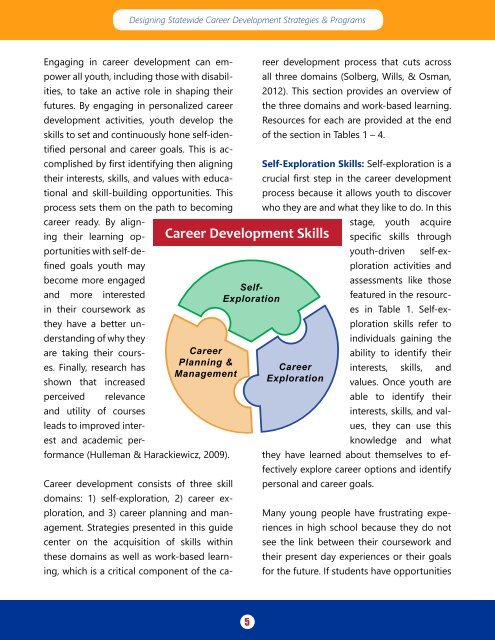Designing Statewide Strategies & Programs
DesigningStatewideCareerDevelopmentStrategiesProgramsPub_0
DesigningStatewideCareerDevelopmentStrategiesProgramsPub_0
Create successful ePaper yourself
Turn your PDF publications into a flip-book with our unique Google optimized e-Paper software.
<strong>Designing</strong> <strong>Statewide</strong> Career Development <strong>Strategies</strong> & <strong>Programs</strong><br />
Engaging in career development can empower<br />
all youth, including those with disabilities,<br />
to take an active role in shaping their<br />
futures. By engaging in personalized career<br />
development activities, youth develop the<br />
skills to set and continuously hone self-identified<br />
personal and career goals. This is accomplished<br />
by first identifying then aligning<br />
their interests, skills, and values with educational<br />
and skill-building opportunities. This<br />
process sets them on the path to becoming<br />
career ready. By aligning<br />
their learning opportunities<br />
with self-defined<br />
goals youth may<br />
become more engaged<br />
and more interested<br />
in their coursework as<br />
they have a better understanding<br />
of why they<br />
are taking their courses.<br />
Finally, research has<br />
Career<br />
Planning &<br />
Management<br />
shown that increased<br />
perceived relevance<br />
and utility of courses<br />
leads to improved interest<br />
and academic performance<br />
(Hulleman & Harackiewicz, 2009).<br />
Career Development Skills<br />
Self-<br />
Exploration<br />
Career development consists of three skill<br />
domains: 1) self-exploration, 2) career exploration,<br />
and 3) career planning and management.<br />
<strong>Strategies</strong> presented in this guide<br />
center on the acquisition of skills within<br />
these domains as well as work-based learning,<br />
which is a critical component of the career<br />
development process that cuts across<br />
all three domains (Solberg, Wills, & Osman,<br />
2012). This section provides an overview of<br />
the three domains and work-based learning.<br />
Resources for each are provided at the end<br />
of the section in Tables 1 – 4.<br />
Self-Exploration Skills: Self-exploration is a<br />
crucial first step in the career development<br />
process because it allows youth to discover<br />
who they are and what they like to do. In this<br />
stage, youth acquire<br />
specific skills through<br />
youth-driven self-exploration<br />
activities and<br />
assessments like those<br />
featured in the resources<br />
in Table 1. Self-exploration<br />
skills refer to<br />
individuals gaining the<br />
ability to identify their<br />
Career interests, skills, and<br />
Exploration values. Once youth are<br />
able to identify their<br />
interests, skills, and values,<br />
they can use this<br />
knowledge and what<br />
they have learned about themselves to effectively<br />
explore career options and identify<br />
personal and career goals.<br />
Many young people have frustrating experiences<br />
in high school because they do not<br />
see the link between their coursework and<br />
their present day experiences or their goals<br />
for the future. If students have opportunities<br />
5


